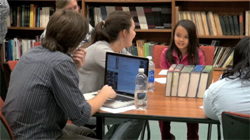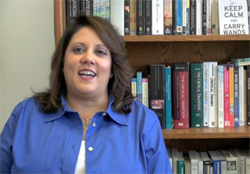4Humanities today debuts the first of the videos produced by its Mini-Documentary Backpack Project (produced by the local chapter of 4Humanities at California State University, Northridge: 4Humanities@CSUN). Mini-doc #1 features the humanities in action in Professor Ranita Chatterjee’s<http://www.csun.edu/engl/profile.php?id=10> classroom, where senior English majors hosted ten-year-old children as their guests. With a sign behind her saying “keep calm and carry wands,” Chatterjee (Dept. of English, California State University, Northridge) shows and explains this unusual class in her course titled “The Trouble with Harry: The Harry Potter Series and Critical Theories.”

Intellectually, the class revolved around complex issues of children’s and teens’ literature. The undergraduates had been asked to read an essay by Perry Nodelman (“The Other: Orientalism, Colonialism, and Children’s Literature,” 1992) that poses the question: why is children’s literature written so often in a way that projects onto children what adults think they should feel and might fantasize about–in essence treating children as colonized “others” or “foreigners”?
But the secret of the class was that these issues welled up from–and were brought to life by–the passion that the college students and their young guests shared for the Harry Potter novels (and for such TV series as Buffy the Vampire Slayer). Chatterjee makes it no secret to her students that she shares that passion herself, making her one of the multi-generational community in her class. The idea for her course, she says, originated when she told undergraduates that she loved the Harry Potter novels and “discovered tons of students who are, like [theatrical gasp pantomiming enthusiasm], I would love to have a Harry Potter class!”

In the video, the undergraduates and their young guests are shown talking to each other at several tables around the room; and the children are interviewed at the end about their reactions to the experience. “The college students really understood what we were talking about,” one child says. Chatterjee notes that the college students were “rather surprised by the insights of the children,” especially their theories and backstories for why the character Voldemort became the way he is and why he might not be so bad. “I thought it worked out pretty well,” she adds.
At the close of the mini-documentary, Chatterjee reflects on the unique mission and methods of the humanities–in this case, of literary studies. The humanities, she says, engage wide audiences in learning about, and through, language as well as about the multimedia imaginative forms that today adapt, extend, or harmonize with, but never abandon, language. “At the end of the day,” she says, “even if it’s visual we’re still listening to language.” The humanities train students to “decode and decipher the words, along with the music and the visuals” to see how “they all work together in [a] . . . beautiful semiotic structure.”
3 thoughts on “4Humanities Backpack Mini-Documentary #1: “A Harry Potter Cross-Generational Discussion””